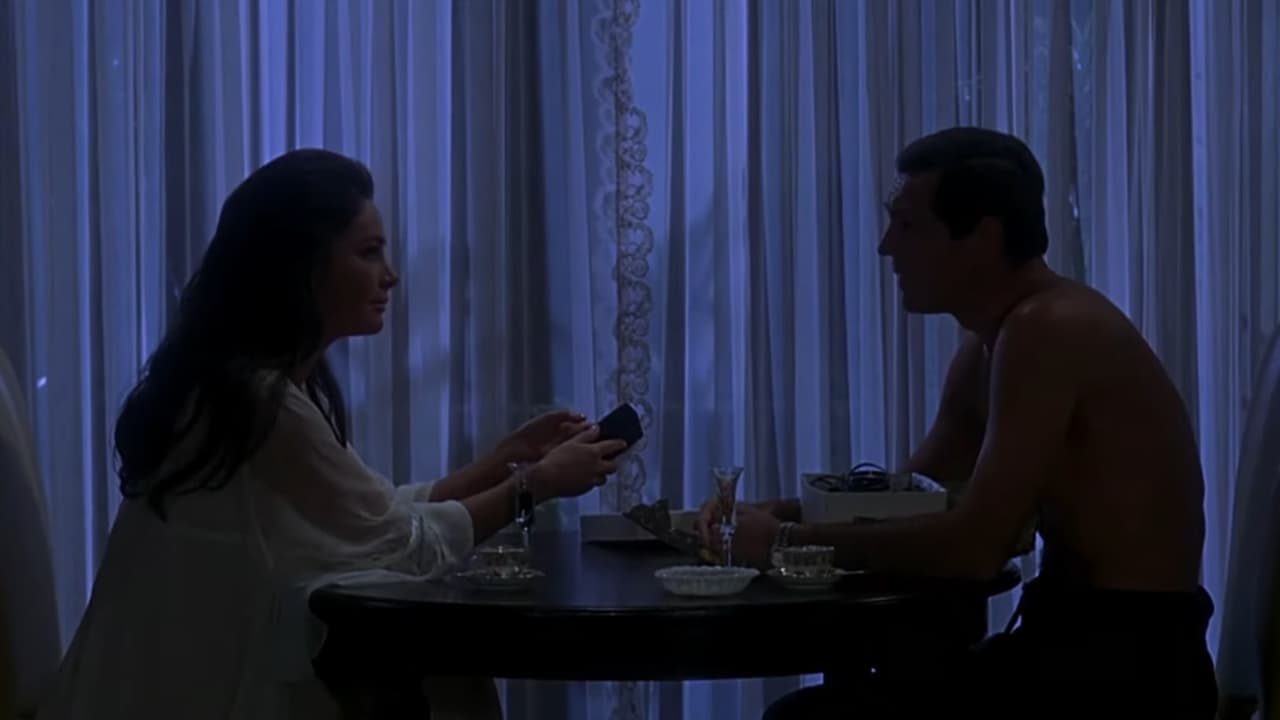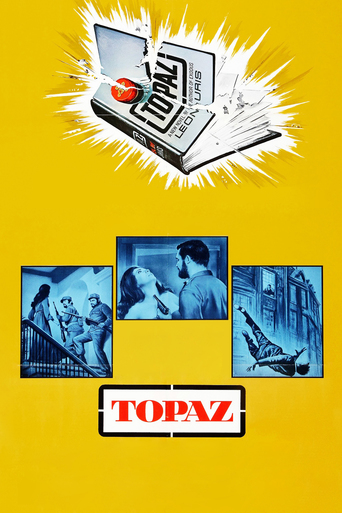

This is not your typical Hitchcock film, nor is it an easy film to follow and understand, but Topaz is a fantastic film! Took me many years of living and a few viewings over the decades to get it. Topaz is complicated, with a half a dozen McGuffins, tons of fascinating and intriguing international subplots, two parallel love stories, and an amazing cast of actors. After watching Hitch films for 50 years, and following the politics and spy craft of America, Cuba, Russia and France, all of which is needed to appreciate this film, for those who do their homework this film will be loved and seen as high quality Hitchcock with tremendous suspense and one awesome Hitchcockian murder scene. Visiting Cuba (yes - go!) and understanding the context of the geo politics in 1962, with respect to Russia, France and America will help greatly. My only fault with the film is the musical score which is subpar; a shame the great composer Bernard Herrmann was not able to work on this film. I will only say this: if you love Hitchcock and modern day geo politics you will love Topaz!
... View MoreAfter directing his works of mountain peaks 10 years earlier with "Vertigo" (1958) over "North by Northwest" (1959) to the crowning all independent produced "Psycho" (1960), Alfred Hitchcock overthrew himself with the fast-tracked adaptation of Leon Uris' Spy Game Thriller "Topaz", telling the story of a french spy, who unravels the schemes of the 1962 Cuba Crisis by exposing french governmental bureaucrats exchanging Russian Intel towards atomic missile logistics in the Caribbean triangle.Director Alfred Hitchcock challenged himself with the second after "Torn Curtain" starring Paul Newman in 1966er espionage story, which had been about an American scientist, who defects back and forth to the East and back to East Germany again, carrying a secret formula, which may change the fronts of the emerging cold war. With "Topaz", the director seemingly wanted to make up for an mediocre hardly suspenseful result of "Torn Curtain", which he felt to be a cinematic failure.Nevertheless provided with less budget production then for "Torn Curtain" of just 4 Million U.S. Dollar and no Hollywood Star in the picture to back him up, Alfred Hitchcock encounters the years towards the end of his career existing Universal Studios distribution deal, before he delivers the infamous line over the phone of his Universal Studio office on July 20th 1978 to Hollywood executive Hilton Green, "I can't go on.", concluding his career with a fairly received crime-comedy genre mix "Family Plot" (1976)."Topaz" became a project under pressure towards tight deadlines and against the success of novel. The picture misses the playful ease of Alfred Hitchcock's films as "Shadow of a Doubt" (1943) or "To Catch a Thief" (1955). The director had the clearly over-rushed novel adaptation to a screenplay by Samuel Taylor, under control, but Alfred Hitchcock did not managed to bring the film's action up to a contemporary pace with an already gone spy action movie hype of the 1960s and six over-achieving 007 movies produced and successfully distributed by independent production company Danjaq, LLC between 1962 to 1969.In "Topaz", Alfred Hitchcock resided in rigid structure of wide to close up dolly camera movements as well as inter-cutting, which had been working all through his career to an defining signature that shaped suspense-triggering-films to this day. The editorial as the cinematographic technique works occasionally as in the scene of killing the character of Juanita de Cordoba, played by Karin Dor, through invading Cuban Military, in a high angle shot of capturing beauty on the fading in green-silk wrapped body sliding to the Villa's foyer floor after receiving an up-close and personal gun shot by the haunting character of Rico Parra, portrayed by actor John Vernon.Another momentum of cinematic significance can be witnessed with the too-late introduced characters of french bureaucracy giving faces by actors Michel Piccoli and Philippe Noiret, who both find death after their public exposure of spying for the Russians in one of two after the previously mentioned interior Cuban Villa Scene, where suspense had been all round up by Director Alfred Hitchcock with combining the spoken word with contradicting action beats in a interviewing scene of Noiret's character of Henri Jarre.The third moment of joyful Hitchcockian mastery presents itself in the final scene regarding the character of Jacques Granville, in manner of a professional actor performed role by Michel Piccoli, where a one shot uses the camera on a crane from close-ups to wide and back to the Piccoli's pitch perfect close-up, revealing Jacques Granville's exclusion from society, underlined by an immense baroque conference hall setting.No doubt that these flickering scene of mastery can not prevent "Topaz" to be another failure of a Hollywood movie with an charming but unappealing, if not to say passive leading character of Andre Devereaux, performed by miscast actor Frederick Stafford, which Alfred Hitchcock could not get to one single break-out beat of struggle, despair nor fighting spirit towards the will to survive a life-threatening situation.Realising his battle against windmills with two failing spy movies, Alfred Hitchcock returned to his crime-menacing thriller roots with "Frenzy", which he presented at Cannes Film Festival on May 19th 1972 to another recalling success of a director, who shaped editorial techniques as well as cinematographic movements in 50 years of film-making like no other to create the diligent and unremitting instrument of suspense in cinema for any genre from timeless comedies over classic drama to high-end contemporary action movies.© 2017 Felix Alexander Dausend (Cinemajesty Enterainments LLC)
... View MoreAfter a string of box office hits, director Alfred Hitchcock's career went into something of a decline in the mid-sixties, with disappointing psychological thriller Marnie, followed by mediocre cold war thriller Torn Curtain, about an American defecting to East Germany.So what did Hitch do next? Why, direct another cold war thriller, of course, only this time he made it even less exciting—a 143 minute long, dialogue heavy snooze-fest that once again starts with a defection, a high ranking Russian leaving his homeland for America. Once on US soil, the defector tells his new hosts about his country's involvement in Cuba. Keen to find out more, the US recruit a French intelligence agent to investigate, which ultimately leads to the discovery of a spy ring in the French government.All of this moves at a snail's pace, with very little of Hitchcock's style in evidence, making it a real struggle to get through to the very end. The sad, pathetic whimper of an end.2/10: I've not seen them all, but this must be a contender for the director's worst movie.
... View MoreI was curious about this film. there was a twenty or so year period where Alfred became Hitchcock and planted down the seed that made him the biggest director in the world, but the guy made movies before and after this period.When we think about the fat man, we think about movies like Psycho and Vertigo which are the highlights and if your a die-hard fan you are familiar with Rope and Strangers on a Train.I was curious about the movies he made out side that twenty year zone, and Topaz was the first that I came up on.Topaz is about a French intelligence agent who gets involved in Cold War politics that lead up to the events of the Cuban Missile Crisis.It's got Hitchcock's stank all over it with camera angles and story set up. One scene in particular, when the french spy has one of his field people get him in to me a Cuban official. The spy watches from across the street as his people make the arrangement. There was no dialogue it was just all visual story telling and it really stands out. The type of scene that Hitchcock fans would rip off over and over again. Too bad Topaz is not a good enough Hitchcock movie.The vibe was just not there. People say Hitchcock lost his edge at this time (He was 69 when he made the film). I think the Birds was the last note worthy film he made, but he kept making films (even one with Robert Redford, which I want to check out).I personally noticed the movie had a different atmosphere, because I noticed that it was filmed outdoors instead of on a sound stage which is where the Fat man made a lot of his films (Not Vertigo, which was filmed all over San Fransisco, and you can take tours of the areas it was filmed).The DVD I saw Topaz on had a interview with Film Critic, Lenard Maltin who stated that Topaz had no stars in it, And that is a point, I knew nobody in this film off hand, and Hitchcock did work with a lot of big stars of the time.Topaz can be handed as proof of what a movie star can do for your film. There is a reason why Cary Grant and Jimmy Stewart are stars. They bring something to the role that no one else possibly could.But Topaz had nobody that I could draw myself to (well, except for Roscoe Lee Browne, a character actor who has made guest appearances on all my favorite television shows that he may as well be a star as far as I'm concern. He was the he guy the french spy got to talk to the Cubans in the no dialog scene, which I guess added more awesomeness for me)While having flavor of the Fat man on it, I found Topaz very drawn out to the point where I lost my interest altogether.If you are a die-hard Hitchcock fan, I would give it a try because it really does have that feel to it, but it does look like he lost his edge around this time and I would not recommend for anyone trying to get into the Fat Man.http://cinemagardens.com/
... View More